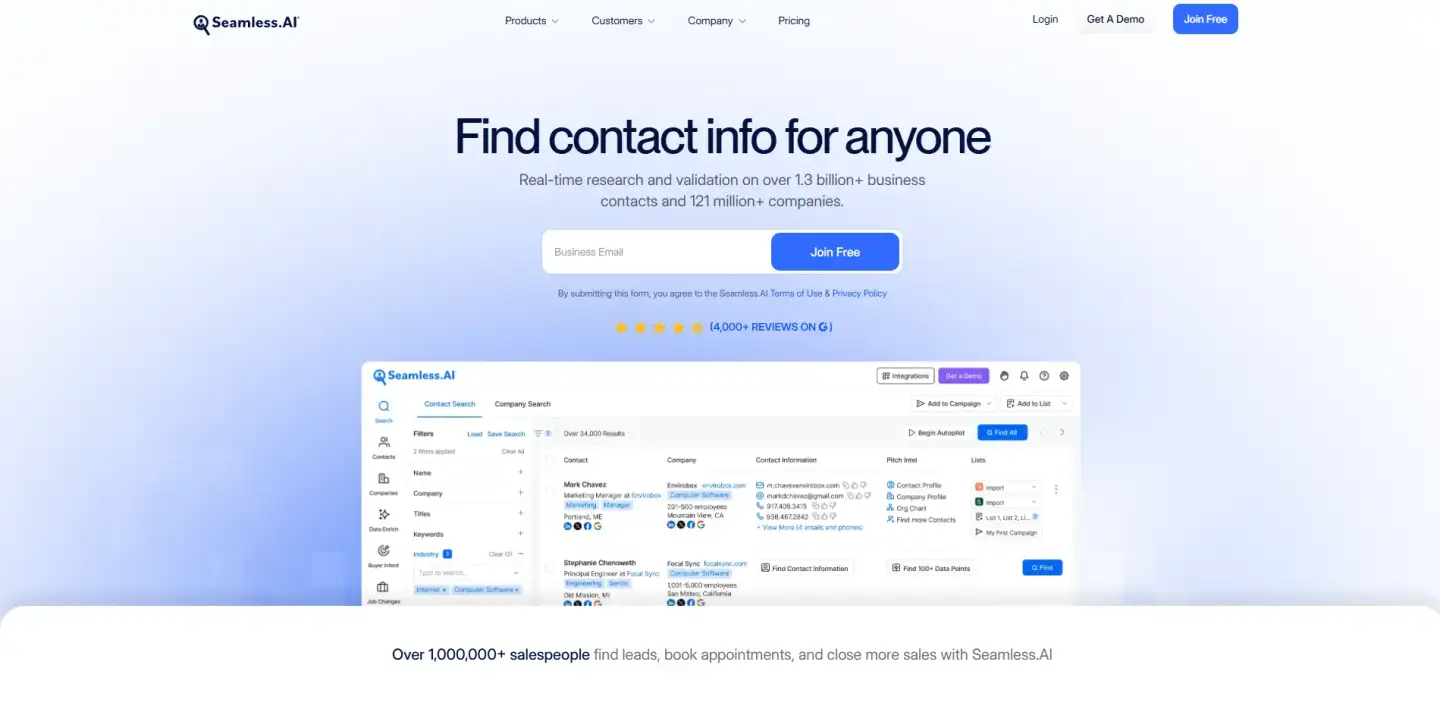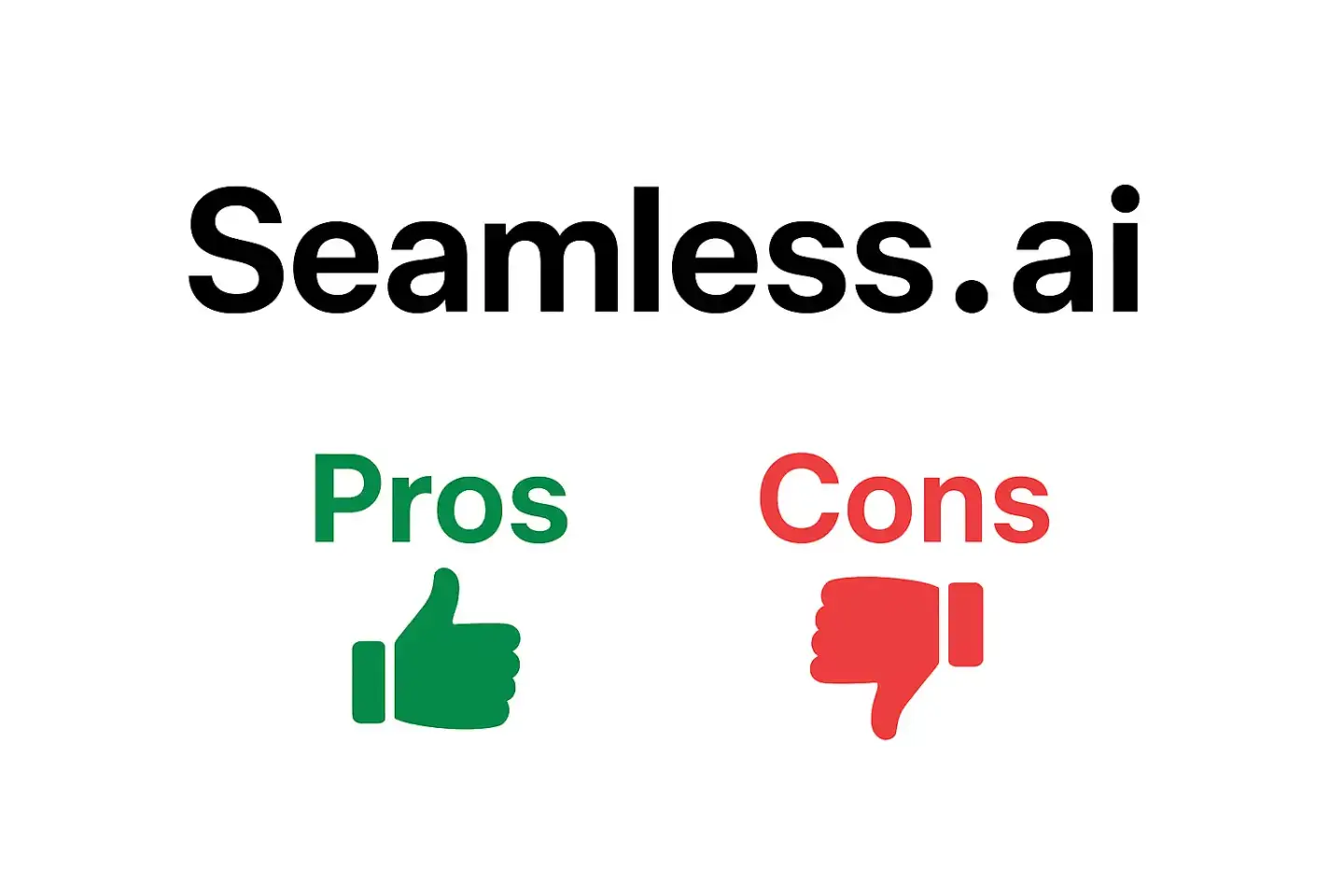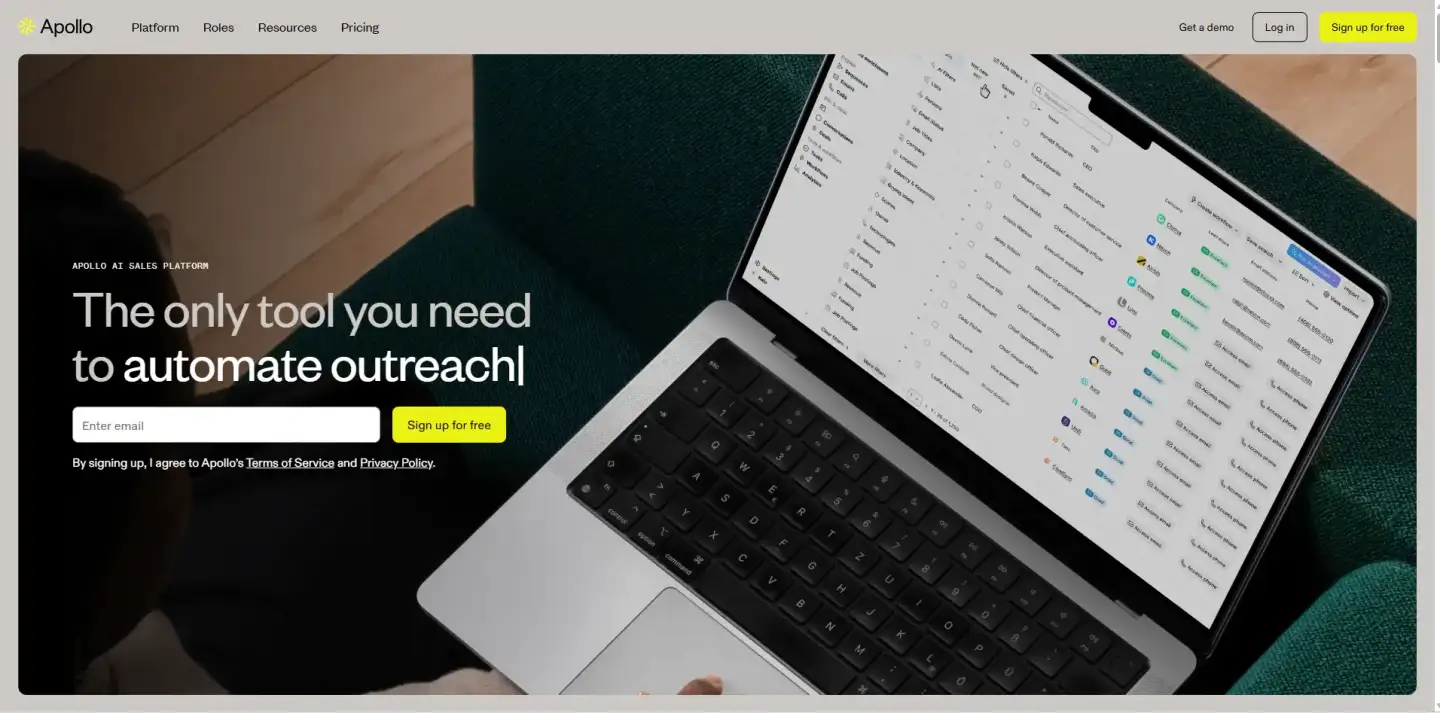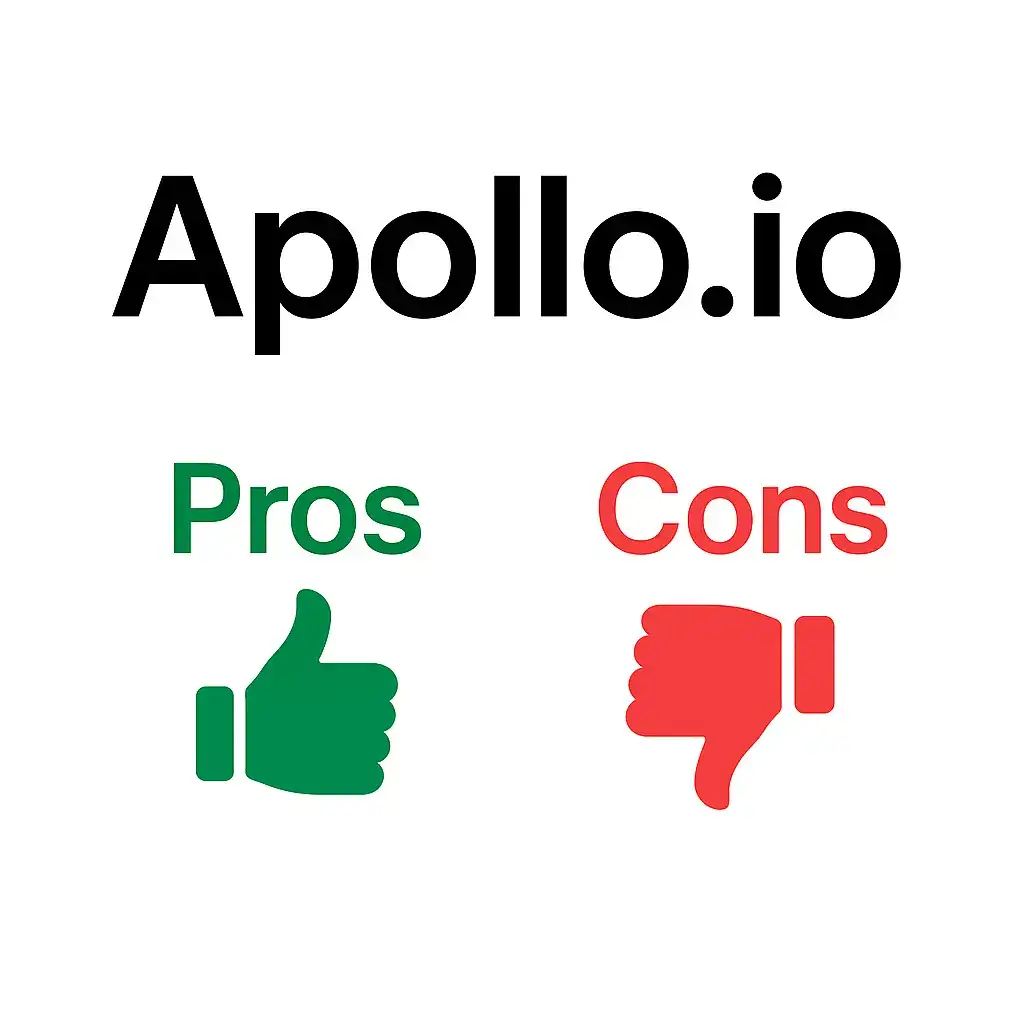In today’s competitive B2B sales environment, choosing the right sales intelligence and lead generation software is critical. Both Seamless.ai and Apollo.io are popular AI-driven platforms that help sales teams find and engage prospects. However, they differ in focus and strengths.
This 2025 comparison covers each platform’s prospecting and enrichment features, data accuracy, pricing and transparency, integrations, ease of use, and real user feedback to help you decide which tool fits your sales strategy.
You can go to the intent data providers section on our website. There, you can look for and pick the best choice for your business :)
Seamless.ai: Specialized B2B Contact Search and Real-Time Data
Seamless.ai was created by serial salesperson Brandon Bornancin and co-founder Michael Hopkins, who began prototyping the idea in 2015–2016 while bootstrapping on pure commission work.
After three years of consulting gigs, sleeping in rental cars, and coding nights to fund development, they officially launched the platform in mid-2018 with the mission to “organize the world’s contacts and make them universally accessible and useful” for sellers.
Built around a proprietary AI engine that verifies phone and email data in real time, Seamless.ai set out to replace static lead lists with a live search-and-enrichment experience. Bornancin, now CEO, still drives the Ohio-based company’s goal of helping revenue teams build profitable relationships faster.
Seamless.ai markets itself as a best-in-class lead-gen platform that mines a live database of 1.3 B+ contacts and 121 M companies. Its proprietary AI instantly returns verified emails and phones by title, industry, or firm size, while a lightweight UI and Chrome extension pull data straight from LinkedIn or any website.
Automatic enrichment appends social profiles and firmographics, and the continuously refreshed database means far fewer stale leads than static lists—one reason many users call its lightning-fast filters their “secret weapon” for multichannel prospecting.
Pricing Summary
Seamless.ai uses a credit-based subscription model (credits are used per data lookup) and custom plans. It does not list flat rates. All plans include a free tier for basic use, but for full features and higher lookup limits, businesses must contact Seamless for pricing. In general:
Free Plan: Limited daily credits, basic search and email lookups.
Professional/Pro: Custom-priced (typically starting around ~$149/mo/user billed annually) for higher credit limits and advanced features.
Enterprise: Tailored solutions with full data access, team seats, and priority support.
Pros
Real-Time Data Accuracy: Continuously updated data (emails, phones, titles) gives more reliable contact.
Fast Prospecting: Simple, fast search filters and a Chrome extension make finding leads quick and salesfinity.ai.
Affordability: Lower upfront costs than enterprise tools (credit model lets smaller teams pay for what they use).
CRM Sync: Direct integrations with popular CRMs (Salesforce, HubSpot, Outreach) ensure leads flow into your.
Ease of Use: Reportedly easier for beginners; the interface is clean and purpose-built for contact.
Cons
Limited Engagement Tools: Lacks built-in email sequencing or multi-channel cadences – it focuses on lead data, not outreach.
Extension-Dependent: Heavily reliant on its browser extension for LinkedIn data; standalone web searches have fewer advanced filters than some competitors.
Pricing Transparency: No public pricing details can make budgeting. Overages and auto-renewals have surprised some.
Data Gaps: Despite a large database, some users report occasional inaccuracies (outdated titles or missing info) requiring manual
Seamless.ai vs Apollo.io: Seamless.ai shines as a data accuracy and prospecting engine, ideal for teams focused on finding accurate contacts quickly. It provides higher lookup limits at similar price points than Apollo and excels at real-time.
While Apollo.io is an all-in-one outreach platform, Seamless.ai is optimized for contact discovery: it does fewer things, but does contact-finding exceptionally well. In head-to-head comparisons, reviewers note Seamless’s friendly interface and affordability for small teams, whereas Apollo’s strength lies.
Apollo.io: All-In-One Sales Engagement and Outreach Platform
Apollo.io was founded in 2015 by Tim Zheng after he grew frustrated with existing prospecting tools while building his first startup, BrainGenie.
Determined to deliver smarter, AI-driven lead discovery, Zheng and his team developed the platform—initially known as ZenProspect—and officially launched it as Apollo.io, spinning it out as an independent company in 2018.
Headquartered in San Francisco, Apollo.io now serves over 40,000 customers with a crowdsourced, community-powered database of 210 million+ contacts and 35 million+ companies, combining real-time enrichment and multichannel engagement features under one roof
Apollo.io is an all-in-one outbound sales platform with a crowdsourced database of 210 M+ contacts and 35 M companies, combining email sequencing, call automation, analytics, and advanced firmographic/technographic filters.
Its AI engine “automates, optimizes & personalizes” multichannel campaigns—complete with built-in dialers, meeting scheduling, Chrome extension, and CRM/marketing-automation integrations. Users praise its data depth and feature breadth, though some report a steeper learning curve.
Pricing Summary
Apollo.io’s pricing is tiered per user, with clear published:
Free Plan: Limited usage, basic search and engagement (good for small trials).
Basic: $49/user/month (annual billing) – includes core features like contact search and email outreach with low.
Professional: $79/user/month – adds more credits, advanced analytics, A/B testing.
Organizational: $119/user/month – full features, highest limits, best suited for larger teams.
Apollo advertises these competitive rates as an “almost unbelievable value” in sales softwareapollo.io. They also promote a free trial for teams to test the platform. However, advanced features (e.g. extra email credits, advanced reporting) increase cost, and larger enterprise users may pay more depending on their usage.
Pros
Huge Contact Database: Over 210M contacts means broad coverage across industriesapollo.io.
Built-In Engagement Tools: Includes email sequencing, call tools, task automation and next-step prompts, enabling true multi-channel campaigns.
Analytics & Lead Scoring: Detailed campaign analytics and AI-driven lead scoring help optimize outreach.
CRM & App Integrations: Deep native sync with major CRMs (Salesforce, HubSpot, Pipedrive, etc. are supported).
Affordable Entry Point: Even the Basic plan is relatively low-cost and includes essential features for startups.
Cons
Learning Curve: The platform’s breadth means it can be complex for new users. Several reviews note that beginners may feel overwhelmed by options.
Data Overlap/Reliability: Some users report duplicated or outdated contacts due to aggregating multiple data sources (Apollo doesn’t own all its data)
Higher Tiers Needed for Scale: To get higher email and search limits, you must upgrade to pricey plans. Large teams may find costs add up, especially if using advanced features.
Less Fresh Data: While Apollo’s data is extensive, Seamless claims faster updates. Some businesses have experienced Apollo records that weren’t as.
Apollo.io vs Seamless.ai: Apollo.io serves as an all-in-one go-to-market platform, excelling in outreach and campaign automation with built-in email cadences, call sequencing, and conversation intelligence. It’s ideal for teams that need a unified engagement suite alongside a vast contact database and advanced analytics.
In contrast, Seamless.ai outshines Apollo in data freshness and simplicity, focusing on real-time contact accuracy and rapid prospecting. Reviewers note that Apollo is “ideal for large volumes and multi-channel features,” whereas Seamless.ai is “best for AI-driven real-time data discovery.”
Feature-by-Feature Comparison
Feature |
Seamless.ai |
Apollo.io |
|---|---|---|
Database size |
1.3 B contacts / 121 M companies (real-time) |
210 M+ contacts / 35 M companies |
Contact data |
AI-verified emails & phones |
Emails, phones, technographics |
Lead enrichment |
Auto AI enrichment (social & firmographics) |
Auto enrichment + CRM sync |
Search filters |
Fast, simple (title • industry • location) |
Granular (tech • intent • firmographics) |
Outreach channels |
Data only (no cadences) |
Email, phone, LinkedIn sequences |
CRM integrations |
Salesforce, HubSpot, Outreach |
Salesforce, HubSpot, Pipedrive, Zoho… |
Workflow automation |
Limited (email sync) |
Tasks, follow-ups, AI assistant |
Platform focus |
Data accuracy & prospecting |
End-to-end sales engagement |
Ease of use |
Very intuitive |
Steeper learning curve |
Pricing model |
Credit-based, custom |
Free → $49 / $79 / $119 per user / mo |
Support |
Email + knowledge base |
Email/chat, webinars, CSMs |
Seamless.ai boasts a real-time database of 1.3 B contacts, AI-verified emails and phones, and ultra-simple filters—perfect for fast, accurate prospecting on a credit-based, custom plan.
If you are still not sure about the best choice for you, feel free to reach out via our website. Our manager will get back to you fast and help you find the right solution for what you need. :)
Apollo.io offers a smaller 210 M-contact pool but bundles multichannel outreach, task automation, and clear tiered pricing (free to $119/user). In short, Seamless.ai wins on data depth, freshness, and ease of use, while Apollo.io excels as an all-in-one engagement suite—powerful yet harder to master.
Customer Feedback & Ease of Use
User reviews reflect the above strengths. On G2, Apollo.io scores around 4.8/5 while Seamless.ai is about 4.2/5salesfinity.ai (Apollo’s higher ratings mostly due to its comprehensive feature set).
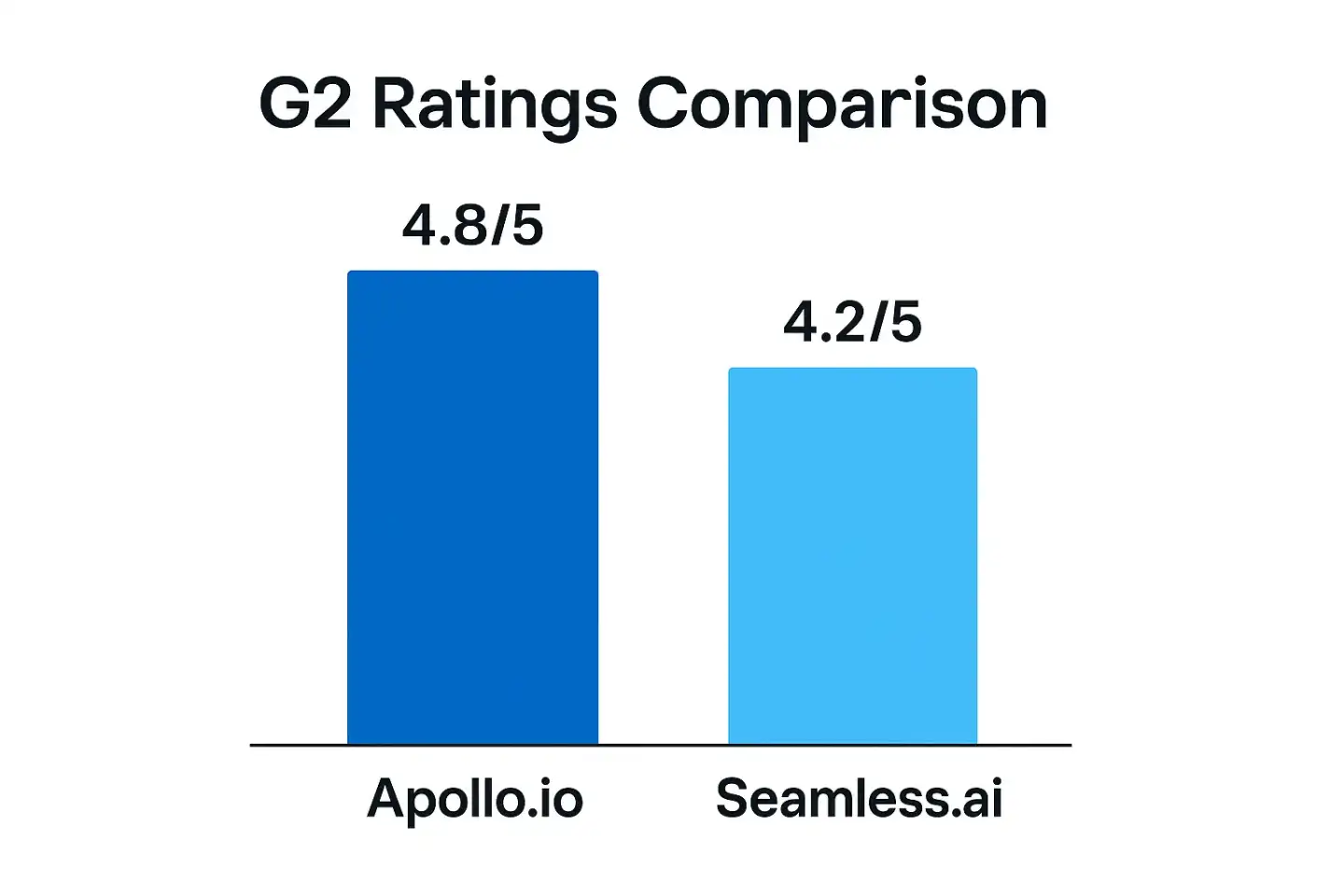
Apollo.io raiting g2
Positive: Users frequently praise Apollo.io for its rich data and built-in tools (one review calls it “an indispensable part of my daily workflow”salesfinity.ai). They also like its smooth CRM sync and affordability.
Positive: For Seamless.ai, reviewers highlight its “fast and accurate” lead search and strong LinkedIn integration. As one marketer puts it, it’s a “secret weapon” for lead generation thanks to quick filtering and up-to-date infosalesfinity.ai.
Criticisms: Some Apollo users report duplicated or outdated data records, and wish for more responsive support on data issuessalesfinity.ai. Seamless users sometimes complain about email accuracy or aggressive upsellssalesfinity.ai. Also, Seamless’s reliance on credits can lead to unexpected costs if usage isn’t monitored closelyskrapp.io.
Ease-of-use leans toward Seamless.ai for small teams: its interface is leaner and easier to grasp, requiring less. Apollo.io, by contrast, offers a powerful toolbox that can be daunting initially.
You can also view a more detailed comparison of other tools, such as cognism vs lusha :)
Both platforms provide onboarding help and resources, but larger organizations may invest more time learning Apollo’s full scope.
Selection criteria
Selection criteria |
Description |
|---|---|
Database size & freshness |
Total contacts/companies available and frequency of data updates |
Data accuracy & depth |
Reliability of emails, phone numbers, firmographics, technographics, and social enrichment |
Lead enrichment capabilities |
Speed and completeness of appending additional insights (titles, profiles, intent signals) |
Search filters & usability |
Ease of building targeted lists using job title, industry, technology, intent, and location |
Outreach & engagement tools |
Built-in email sequencing, dialing, LinkedIn messaging, and analytics |
Integrations & workflow automation |
Native CRM/marketing-automation sync, task automation, and API access |
Pricing transparency & scalability |
Clarity of plans, cost per user or credit, and ability to scale with team size |
Support & resources |
Onboarding, training materials, dedicated account management, and community forums |
The table compares Seamless.ai and Apollo.io across database size & freshness, data accuracy & enrichment, search filter usability, outreach tools, integrations & automation, pricing scalability, and support quality.
Why Seamless.ai still comes out on top
In the Seamless.ai vs Apollo.io contest, Seamless.ai pulls ahead thanks to its unmatched data freshness and precision: real-time AI verification means you rarely chase dead or outdated emails and phones.
Its ultra-intuitive interface and Chrome extension let reps unlock accurate contacts in seconds—with no steep learning curve—while a pay-as-you-go credit model keeps costs predictable for teams of any size.
Combine that with seamless CRM syncing and automated enrichment (social profiles, firmographics) and you get a lean, focused tool built expressly for rapid, reliable prospecting—making Seamless.ai the smarter choice for sales teams that need speed, accuracy, and simplicity.
Conclusion
For sales teams that value speed, accuracy, and simplicity, Seamless.ai clearly takes the lead. Its real-time AI verification, lightning-fast filters, and transparent credit-based pricing let reps uncover fresh, high-quality contacts in seconds—with virtually no learning curve.
While Apollo.io shines with its all-in-one outreach suite and massive database, that power comes with added complexity and higher tiers. In 2025, Seamless.ai remains the smarter choice for small-to-mid-sized teams focused on rapid, reliable prospecting without the overhead of a full campaign platform.
I hope you found the solution that best suits your needs. If you're looking for more comparisons, feel free to check out our blog :)
FAQ
Last Upated: 30.04.25
Seamless.ai focuses exclusively on real-time contact discovery, offering AI-verified emails and phone numbers through instant lookups. Apollo.io, by contrast, combines data with built-in outreach tools (email sequencing, dialers, analytics) to power end-to-end sales campaigns.
Seamless.ai’s proprietary AI engine continuously revalidates its 1.3 billion+ contacts, minimizing stale or bounced info. Apollo.io aggregates from multiple sources, giving you breadth but occasionally requiring manual deduplication or verification.
Seamless.ai uses a credit-based, custom-priced system (with a free tier), letting teams pay only for lookups they actually use. Apollo.io publishes tiered plans ranging from a free option up to $119/user per month, which include increasing outreach credits and analytics features.
No—Seamless.ai focuses on contact search and enrichment. For multichannel cadences, you’ll need to integrate with platforms like Outreach, Salesloft, or your CRM. Apollo.io, on the other hand, offers built-in sequencing and call automation right in its platform.
For quick adoption and minimal training, Seamless.ai wins—its clean UI and Chrome extension are intuitive for reps. Apollo.io delivers more features out of the box but has a steeper learning curve as you master its campaign builder and analytics dashboards.



